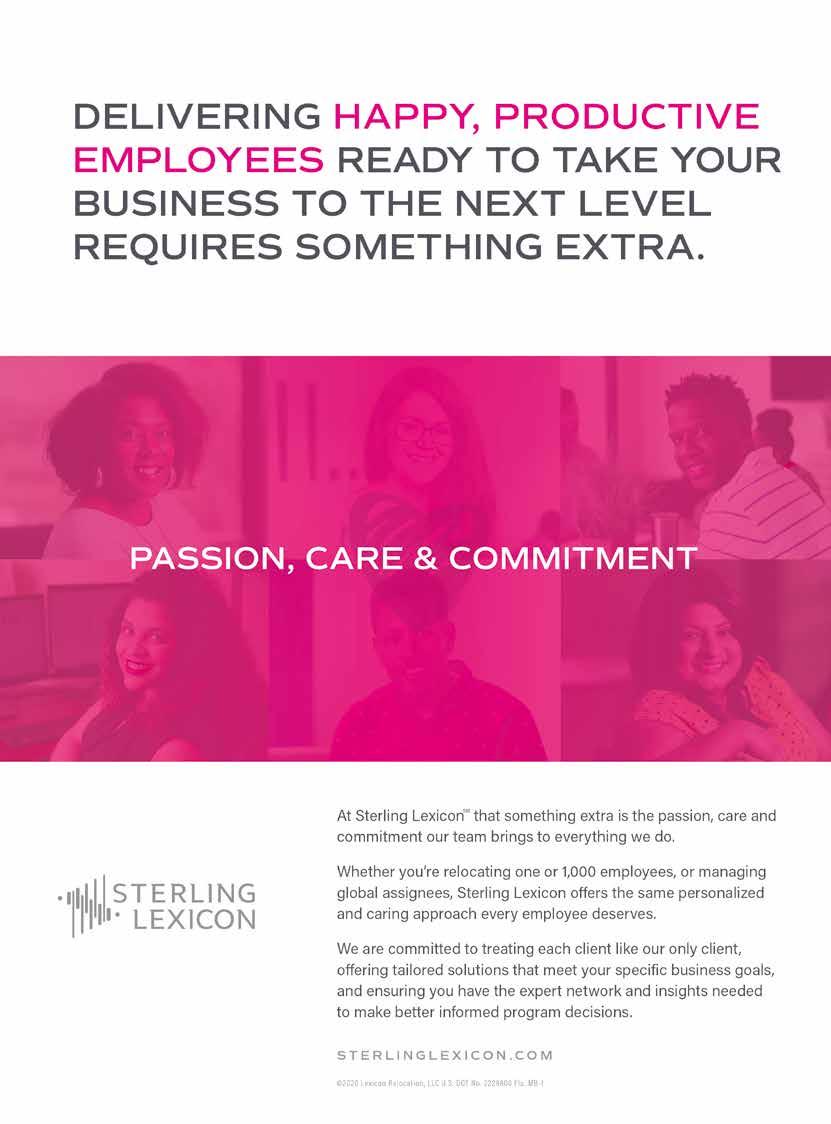
9 minute read
The Role Of Payroll In The Future Of Work
The future of work is here. In the spring edition of International HR Adviser, my Deloitte colleagues talked about the opportunity for global mobility. In this article we consider the future of work in the context of payroll and workforce management.
Three significant forces are at play in changing the world of payroll and workforce management:
1. A Dynamic And Complex Environment We continue to globalise our workforce and require greater flexibility in how we move and pay people. In the aftermath of COVID-19, the physical movement of workers may be reduced in the short or perhaps longerterm. However, sophisticated workforce management (time and attendance) tools will still be required to meet compliance obligations and protect against fraud, but they are equally a smart play in enabling organisations to be more strategic about how they predict, plan for, and deploy resources. Arguably, this is even more the case in a world where physical movement is restricted. We are already witnessing businesses critically assessing their workforce management platforms, as part of wider business continuity planning, as they recover from the impact of the pandemic. These technologies are intrinsically linked to the payroll application, and the two must never be allowed to be mutually exclusive.
The components of total reward are becoming more diverse. This diversity often brings complexity. For example, as companies shift from viewing wellbeing as a health benefit, to seeing it as a performance improvement strategy, they are increasingly investing in physical, mental, financial, family and social wellbeing packages (1) . It is true that the payroll function rests downstream of this, but the complexity comes from yet another source of data that must be identified and extracted, with appropriate pay components being globally established to process the compensation.
2. The Rise Of The Worker The worker is the consumer, and the importance of their pay experience is gaining momentum. This manifests itself in the need for employees to access pay data seamlessly and in real time, and often on a mobile device, but also in the rise of ‘payon-demand’.
For the uninitiated, pay-on-demand is a mechanism that allows workers to access their pay as it is earnt, rather than waiting until the next payroll cycle to receive it. To date, payon-demand has most prevailed in the USA. This may be a feature of a large gig economy, but it is also estimated that 78% of US workers are living ‘paycheck to paycheck’ to make ends meet (2) . In the UK, more companies are emerging, offering access to some elements of pay as it is earnt (3) . There is an underlying belief here too, that this may alleviate the nation’s dependency on high cost credit. In the current global environment it would not be a surprise to see this trend increase.
Aside from the more pioneering areas like pay-on-demand, it seems that the traditional payroll adage of ‘getting it done correctly and getting it done on time’ is still not reflected consistently in the employee experience. In the 2019 Pay Experience report, 31% of survey respondents claimed to have been paid inaccurately at least once in the last twelve months, and 24% had received a late payment at least once in the last 12 months (rising to 31% for the contractor and freelancer cohort). (4)
The report concludes that accuracy and timeliness are non-negotiable aspects of paying people, and against this backdrop of inconsistency organisations should consider opportunities to further automate data collection and payroll processing, with integrated Human Capital Management (HCM) solutions that support digital transformation.
3. Technology Abounds! The advent of cloud-based platforms is changing expectations. Companies are looking more and more for a “one stop shop” for all of the different parts of the HR value chain, with payroll and workforce management increasingly a feature of this.
The growth of automation, robotics and artificial intelligence, are fundamentally changing the payroll function and the payroll market; bots now have the ability to carry out unsupervised data scraping, cleaning, migration and integration.
This clearly is a threat to the traditional models that rely on the collation and processing of payroll data by a team of humans, often located in a relatively high cost location. This trend will disrupt the more traditional in-house functions, but also impact the outsourcing and offshoring market whereby - to coin the terminology of The Technology Adoption Curve - the late majority and laggards will get quickly left behind. (5)
Another topical debate is whether the advent in cloud-based platforms will give way to a shift back in-house. The leading HCM platforms now have payroll modules as part of their suites, which is a significant development in the payroll market. (6) The provision of the Cloud SaaS model also lends itself to having internal payroll resources, which is one of the factors attributed to the increasing trend of clients bringing some payroll services back in-house.
The Payroll Function Of The Future To be ready for the Future of Work, and to keep apace or even get ahead of the rapidly changing environment, smart companies will be considering how they deliver, transform and disrupt.
Deliver We summarised earlier how the basics of payroll delivery have still not been totally captured.
Identifying what the challenges are in enabling 100% accuracy and timeliness of pay delivery is a crucial first step. This will create a platform for transformation priorities that may involve:
• Training of key staff (both technical and soft skills) • Reducing manual interventions through automation and integrations • Deploying smarter technology platforms • (In the case of outsourced services) a root and branch review of the contract, pricing,
KPIs, SLAs and overall return on investment in an outsourced model. Key features of delivery for a function that has mastered the basics will be: • Employee experience – maximising the employee’s experience of pay via smart user interfaces and real-time access to data on mobile devices • Pay transparency – clear and proactive communications about pay, and data driven analytics on pay made available to the workforce • Supporting financial wellness – the payroll function of the future may take a greater lead in a company’s strategy on financial wellness, through adapting pay frequencies, enabling a more solution-led approach to employee queries and driving decisions about the wellness agenda through databased insights and predictive analytics.
Transform Key themes in the market are as follows: • There has been a significant move towards adoption of the payroll suites of the leading
HCM software providers by large companies • We are witnessing a transition by some organisations, moving some payroll services back in-house • Hybrid solutions are being utilised by companies, who, wary of data confidentiality issues end up processing payroll in-house • Emerging markets, particularly in Latin
America, are exhibiting an increased need for payroll processing companies. Transformation agendas will naturally vary from organisation to organisation. A useful initial transformation lens is for the business to determine if their goal is for the payroll function to remain primarily operationally focused, or if it wishes to harness the vast transformational power within payroll data to become a strategically additive part of the business. Understanding this up front will drive very different discussions, decisions and actions as to: • Skill requirements in payroll - what will be the enduring human skills required for a payroll professional once organisations fully deploy intelligent automation and data analysis? • Where the payroll function sits (HR, finance, stand-alone) • Technology platforms and solutions In-house versus outsourced Offshore versus onshore.
Disrupt The ecosystem: the smart answer to the one-stop shop.
Organisations have often organically evolved a patchwork of applications and systems over time. Business leaders however, are typically demanding a digital strategy, delivering a future-proofed, scalable, and operationally excellent platform. The net result is a tremendous pent-up demand to democratise process automation and data integration. Robotic Process Automation (RPA) may fulfil one particular need, but requires strategy, guardrails and governance. (7)
There is a clear opportunity for the payroll function to sit at the centre of a significant and positive disruptive force in the business. If we think about how we pay and deploy the workforce in an organisation, payroll and payroll data is front and centre – a potential single source of truth.
In a well-integrated ecosystem of vendors and platforms, payroll data has the potential power to enable the automation of a vast array of tasks and obligations that currently (i) Sit in silos, (ii) Are subject to manual interventions, (iii) Are at risk of error and (iv) Are delivered at great cost.
The payroll ecosystem for a global workforce: Simplified, minimal touchpoints, full vendor collaboration and data integration
What Next? The role of global payroll in the Future of Work is perhaps not yet fully defined, however, the opportunity and the potential power that a strategic payroll function sitting at the core of an ecosystem of vendors and technology is clear.
It is not hard to envisage a near-future world where paper tax returns and other filings relating to pay and people have become obsolete. When this happens, authorities will expect automated real-time flows of data. This will require digitally enabled information management and reporting, and don’t forget the increasing imperative for an enhanced user experience for all stakeholders. Payroll and workforce management has the potential to drive this future state.
Is your organisation ready?
References: (1) In a recent survey completed by Optum, more than 45% of companies are increasing investment in this segment.
2020 HR Technology Market. Josh Bersin. (2) CareerBuilder (2017), Living Paycheck to
Paycheck is a Way of Life for Majority of U.S. Workers, According to New
CareerBuilder Survey, http://press. careerbuilder.com/2017-08-24-Living
Paycheck-to-Paycheck-is-a-Way-of-Lifefor-Majority-of-U-S-Workers-Accordingto-New-CareerBuilder-Survey. (3) Although it should be noted that, a true pay-on-demand service in the
UK would be unworkable without legislative change. (4) Ceridian: The UK Pay Experience Report:
Employee perspectives on payroll and compensation. 2019. (5) In the early days of RPA adoption, many shared service centres adopted RPA – three years ago over 80% of shared service centres reported using RPA.
Gartner. Predicts 2020: RPA Renaissance
Driven by Morphing Offerings and Zeal for Operational Excellence. (6) In the UK, the overwhelming majority of payrolls (72%) are still being operated completely in-house. The remaining elements are split by either partially outsourced (partially managed) (22%) and completely outsourced (fully managed.) CIPP Future of Payroll
Report, 2019. (7) Gartner. Predicts 2020: RPA Renaissance
Driven by Morphing Offerings and Zeal for Operational Excellence.
HAYLEY MCKELVEY Partner, Payroll and Workforce Management, Deloitte LLP 2 New Street Square, London, EC4A 3BZ +44 207 303 3940 hmckelvey@Deloitte.co.uk www.deloitte.com/uk/en/pages/ tax/articles/payroll-and-workforcemanagement.html


NATHAN MALE Partner, Payroll and Workforce Management, Deloitte LLP 2 New Street Square, London, EC4A 3BZ +44 207 007 8364 nmale@deloitte.co.uk www.deloitte.com/uk/en/pages/ tax/articles/payroll-and-workforcemanagement.html
DELOITTE’S PAYROLL AND WORKFORCE MANAGEMENT PRACTICE Our mission is to define the payroll function of the future, for the workforce of the future. We created Deloitte Payroll and Workforce Management to deliver, transform and disrupt. We partner with organisations to solve the most complex challenges driving employee experience, efficiency and value. We deploy Deloitte market knowledge, subject matter expertise and insight to rethink the payroll and workforce management function. We focus on a range of areas including global payroll delivery, strategy design, operational optimisation, vendor selection, technology implementation, automation and ecosystem design. Find out more here www.deloitte.com/uk/en/pages/tax/articles/payroll-and-workforcemanagement.html


